马杜拉国际财务管理第一章
- 格式:ppt
- 大小:357.50 KB
- 文档页数:19
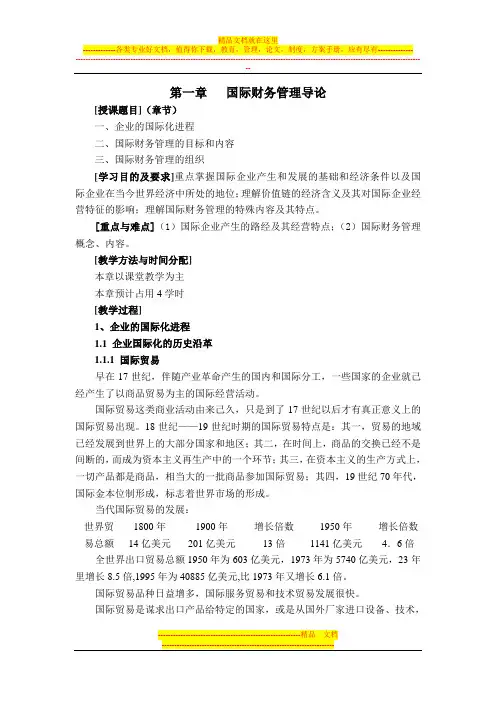
第一章国际财务管理导论[授课题目](章节)一、企业的国际化进程二、国际财务管理的目标和内容三、国际财务管理的组织[学习目的及要求]重点掌握国际企业产生和发展的基础和经济条件以及国际企业在当今世界经济中所处的地位;理解价值链的经济含义及其对国际企业经营特征的影响;理解国际财务管理的特殊内容及其特点。
[重点与难点](1)国际企业产生的路经及其经营特点;(2)国际财务管理概念、内容。
[教学方法与时间分配]本章以课堂教学为主本章预计占用4学时[教学过程]1、企业的国际化进程1.1 企业国际化的历史沿革1.1.1 国际贸易早在17世纪,伴随产业革命产生的国内和国际分工,一些国家的企业就己经产生了以商品贸易为主的国际经营活动。
国际贸易这类商业活动由来己久,只是到了17世纪以后才有真正意义上的国际贸易出现。
18世纪——19世纪时期的国际贸易特点是:其一,贸易的地域已经发展到世界上的大部分国家和地区;其二,在时间上,商品的交换已经不是间断的,而成为资本主义再生产中的一个环节;其三,在资本主义的生产方式上,一切产品都是商品,相当大的一批商品参加国际贸易;其四,19世纪70年代,国际金本位制形成,标志着世界市场的形成。
当代国际贸易的发展:世界贸易总额1800年1900年增长倍数1950年增长倍数14亿美元201亿美元13倍1141亿美元4.6倍全世界出口贸易总额1950年为603亿美元,1973年为5740亿美元,23年里增长8.5倍,1995年为40885亿美元,比1973年又增长6.1倍。
国际贸易品种日益增多,国际服务贸易和技术贸易发展很快。
国际贸易是谋求出口产品给特定的国家,或是从国外厂家进口设备、技术,这种企业的国际经营风险较小,利润也薄。
1.1.2 19世纪中叶,西方企业的海外活动重心逐渐由贸易转向资本输出。
初期是间接投资占主导地位(购买外国公债)以及不是以拥有控股权的股票投资。
也有一些发达国家的大型企业通过对外直接投资,在海外设立分支机构和子公司。

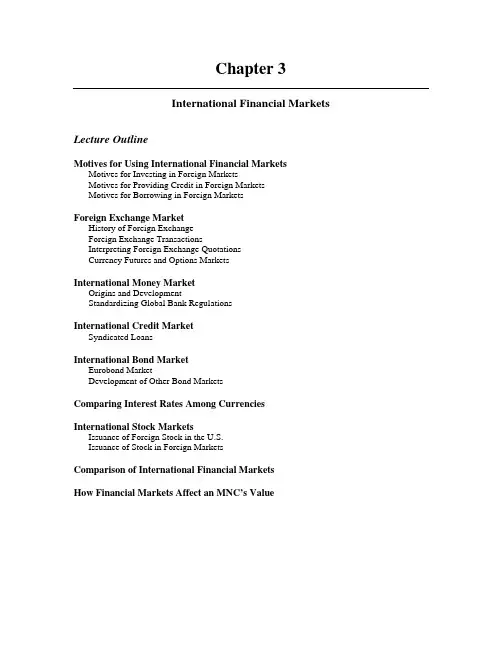
Chapter 3International Financial Markets Lecture OutlineMotives for Using International Financial Markets Motives for Investing in Foreign MarketsMotives for Providing Credit in Foreign MarketsMotives for Borrowing in Foreign MarketsForeign Exchange MarketHistory of Foreign ExchangeForeign Exchange TransactionsExchange QuotationsForeignInterpretingCurrency Futures and Options MarketsInternational Money MarketOrigins and DevelopmentStandardizing Global Bank RegulationsInternational Credit MarketSyndicated LoansInternational Bond MarketEurobond MarketDevelopment of Other Bond MarketsComparing Interest Rates Among CurrenciesInternational Stock MarketsIssuance of Foreign Stock in the U.S.Issuance of Stock in Foreign MarketsComparison of International Financial MarketsHow Financial Markets Affect an MNC’s ValueChapter ThemeThis chapter identifies and discusses the various international financial markets used by MNCs. These markets facilitate day-to-day operations of MNCs, including foreign exchange transactions, investing in foreign markets, and borrowing in foreign markets.Topics to Stimulate Class Discussion1. Why do international financial markets exist?2. How do banks serve international financial markets?3. Which international financial markets are most important to a firm that consistently needsshort-term funds? What about a firm that needs long-term funds?Critical debateShould firms that go public engage in international offerings?Proposition Yes. When a firm issues shares to the public for the first time in an initial public offering (IPO), it is naturally concerned about whether it can place all of its shares at a reasonable price. It will be able to issue its shares at a higher price by attracting more investors. It will increase its demand by spreading the shares across countries. The higher the price at which it can issue shares, the lower is its cost of using equity capital. It can also establish a global name by spreading shares across countries.Opposing view No. If a firm spreads its shares across different countries at the time of the IPO, there will be less publicly traded shares in the home country. Thus, it will not have as much liquidity in the secondary market. Investors desire shares that they can easily sell in the secondary market, which means that they require that the shares have liquidity. To the extent that a firm reduces its liquidity in the home country by spreading its share across countries, it may not attract sufficient home demand for the shares. Thus, its efforts to create global name recognition may reduce its name recognition in the home country.With whom do you agree? State your reasons. Use InfoTrac or some other search engine to learn more about this issue. Which argument do you support? Offer your own opinion on this issue.ANSWER: The key is that students recognize the tradeoff involved. A firm that engages in a relatively small IPO will have limited liquidity even when all of the stock is issued in the home country. Thus, it should not consider issuing stock internationally. However, firms with larger stock offerings may be in a position to issue a portion of their shares outside the home country. They should not spread the stocks across several countries, but perhaps should target one or two countries where they conduct substantial business. They want to ensure sufficient liquidity in each of the foreign countries where they sell shares.Stock Markets are inefficientPropositionI cannot believe that if the value of the euro in terms of, say, the British pound increases three days in a row, on the fourth day there is still a 50:50 chance that it will go up or down in value. I think that most investors will see a trend and will buy, therefore the price is morelikely to go up. Also, if the forward market predicts a rise in value, on average, surely it is going to rise in value. In other words, currency prices are predictable. And finally, if it were so unpredictable and therefore unprofitable to the speculator, how is it that there is such a vast sum of money being traded every day for speculative purposes – there is no smoke without fire.The simple answer is that if that is what you believe, buy currencies that have viewOpposingincreased three days in a row and on average you should make a profit, buy currencies where the forward market shows an increase in value. The fact is that there are a lot of investors with just your sort of views. The market traders know all about such beliefs and will price the currency so that such easy profit (their loss) cannot be made. Look at past currency rates for yourself, check all fourth day changes after three days of rises, any difference is going to be not enough to cover transaction costs or trading expenses and the slight inaccuracy in your figures which are likely to be closing day mid point of the bid/ask spread. No, all currency movements are related to information and no-one knows if tomorrows news will be better or worse than expected.With whom do you agree? Could there be undiscovered patterns? Could some movements not be related to information? Could some private news be leaking out?ANSWER: Clearly there are no obvious patterns. Discussion on the impossibility of obvious patterns is worth emphasizing. However, does market inefficiency necessarily involve patterns, could market manipulation be occasional. There is worrying evidence from share price movements that there is unusual movement before announcements on many occasions, so the ideathat traders do not occasionally collude and move the price without supporting economic evidence is not an unreasonable view. Proof is however difficult as we have to separate anticipation from prior knowledge, the lucky speculator from the speculator who was in the know.Answers to End of Chapter Questions1. Motives for Investing in Foreign Money Markets. Explain why an MNC may invest fundsin a financial market outside its own country.ANSWER: The MNC may be able to earn a higher interest rate on funds invested in a financial market outside of its own country. In addition, the exchange rate of the currency involved may be expected to appreciate.2. Motives for Providing Credit in Foreign Markets. Explain why some financial institutionsprefer to provide credit in financial markets outside their own country.ANSWER: Financial institutions may believe that they can earn a higher return by providing credit in foreign financial markets if interest rate levels are higher and if the economic conditions are strong so that the risk of default on credit provided is low. The institutions may also want to diversity their credit so that they are not too exposed to the economic conditions in any single country.3. Exchange Rate Effects on Investing. Explain how the appreciation of the Australian dollaragainst the euro would affect the return to a French firm that invested in an Australian money market security.ANSWER: If the Australian dollar appreciates over the investment period, this implies that the French firm purchased the Australian dollars to make its investment at a lower exchange rate than the rate at which it will convert A$ to euros when the investment period is over.Thus, it benefits from the appreciation. Its return will be higher as a result of this appreciation.4. Exchange Rate Effects on Borrowing. Explain how the appreciation of the Japanese yenagainst the UK pound would affect the return to a UK firm that borrowed Japanese yen and used the proceeds for a UK project.ANSWER: If the Japanese yen appreciates over the borrowing period, this implies that the UK firm converted yen to pounds at a lower exchange rate than the rate at which it paid for yen at the time it would repay the loan. Thus, it is adversely affected by the appreciation. Its cost of borrowing will be higher as a result of this appreciation.5. Bank Services. List some of the important characteristics of bank foreign exchange servicesthat MNCs should consider.ANSWER: The important characteristics are (1) competitiveness of the quote, (2) the firm’s relationship with the bank, (3) speed of execution, (4) advice about current market conditions, and (5) forecasting advice.6. Bid/ask Spread. Delay Bank’s bid price for US dollars is £0.53 and its ask price is £0.55.What is the bid/ask percentage spread?ANSWER: (£0.55– £0.53)/£0.55 = .036 or 3.6%7. Bid/ask Spread. Compute the bid/ask percentage spread for Mexican peso in which the askrate is 20.6 New peso to the dollar and the bid rate is 21.5 New peso to the dollar.ANSWER: direct rates are 1/20.6 = $0.485:1 peso as the ask rate and 1/21.5 = $0.465:1 peso as the bid rate so the spread is[($0.485 – $0.465)/$0.485] = .041, or 4.1%. Note that the spread is fro the Mexiccan peso not the dollar.8. Forward Contract. The Wolfpack ltd is a UK exporter that invoices its exports to the UnitedStates in dollars. If it expects that the dollar will appreciate against the pound in the future, should it hedge its exports with a forward contract? Explain..ANSWER: The forward contract can hedge future receivables or payables in foreign currencies to insulate the firm against exchange rate risk. Yet, in this case, the Wolfpack Corporation should not hedge because it would benefit from appreciation of the dollar when it converts the dollars to pounds.9. Euro. Explain the foreign exchange situation for countries that use the euro when theyengage in international trade among themselves.ANSWER: There is no foreign exchange. Euros are used as the medium of exchange.10. Indirect Exchange Rate. If the direct exchange rate of the euro is worth £0.685, what is theindirect rate of the euro? That is, what is the value of a pound in euros?ANSWER: 1/0.685 = 1.46 euros.11. Cross Exchange Rate. Assume Poland’s currency (the zloty) is worth £0.17 and theJapanese yen is worth £0.005. What is the cross (implied) rate of the zloty with respect to yen?ANSWER: £0.17/£0.005 = 34 zloty:1 yen12. Syndicated Loans. Explain how syndicated loans are used in international markets.ANSWER: A large MNC may want to obtain a large loan that no single bank wants to accommodate by itself. Thus, a bank may create a syndicate whereby several other banks also participate in the loan.13. Loan Rates. Explain the process used by banks in the Eurocredit market to determine the rateto charge on loans.ANSWER: Banks set the loan rate based on the prevailing LIBOR, and allow the loan rate to float (change every 6 months) in accordance with changes in LIBOR.14. International Markets. What is the function of the international money market? Brieflydescribe the reasons for the development and growth of the European money market. Explain how the international money, credit, and bond markets differ from one another.ANSWER: The function of the international money market is to efficiently facilitate the flow of international funds from firms or governments with excess funds to those in need of funds.Growth of the European money market was largely due to (1) regulations in the U.S. that limited foreign lending by U.S. banks; and (2) regulated ceilings placed on interest rates of dollar deposits in the U.S. that encouraged deposits to be placed in the Eurocurrency market where ceilings were nonexistent.The international money market focuses on short-term deposits and loans, while the international credit market is used to tap medium-term loans, and the international bond market is used to obtain long-term funds (by issuing long-term bonds).15. Evolution of Floating Rates. Briefly describe the historical developments that led to floatingexchange rates as of 1973.ANSWER: Country governments had difficulty in maintaining fixed exchange rates. In 1971, the bands were widened. Yet, the difficulty of controlling exchange rates even within these wider bands continued. As of 1973, the bands were eliminated so that rates could respond to market forces without limits (although governments still did intervene periodically).16. International Diversification. Explain how the Asian crisis would have affected the returnsto a UK. firm investing in the Asian stock markets as a means of international diversification.[See the chapter appendix.]ANSWER: The returns to the UK firm would have been reduced substantially as a result of the Asian crisis because of both declines in the Asian stock markets and because of currency depreciation. For example, the Indonesian stock market declined by about 27% from June 1997 to June 1998. Furthermore, the Indonesian rupiah declined against the U.S. dollar by 84%.17.Eurocredit Loans.a.With regard to Eurocredit loans, who are the borrowers?b. Why would a bank desire to participate in syndicated Eurocredit loans?c. What is LIBOR and how is it used in the Eurocredit market?ANSWER:a. Large corporations and some government agencies commonly request Eurocredit loans.b. With a Eurocredit loan, no single bank would be totally exposed to the risk that theborrower may fail to repay the loan. The risk is spread among all lending banks within the syndicate.c. LIBOR (London interbank offer rate) is the rate of interest at which banks in Europe lendto each other. It is used as a base from which loan rates on other loans are determined in the Eurocredit market.18. Foreign Exchange. You just came back from Canada, where the Canadian dollar was worth£0.43. You still have C$200 from your trip and could exchange them for pounds at the airport, but the airport foreign exchange desk will only buy them for £0.40. Next week, you will be going to Mexico and will need pesos. The airport foreign exchange desk will sell you pesos for £0.055 per peso. You met a tourist at the airport who is from Mexico and is on his way to Canada. He is willing to buy your C$200 for 1500 New Pesos. Should you accept the offer or cash the Canadian dollars in at the airport? Explain.ANSWER: Exchange with the tourist. If you exchange the C$ for pesos at the foreign exchange desk, the C$200 is multiplied by £0.40 and then divided by £0.055 ie a ratio of £0.40/0.055 = 7.27 pesos to the C$. The total pesos would be 200 x 7.27 = 1454 pesos, a little less than is being offered by the tourist.19. Foreign Stock Markets. Explain why firms may issue stock in foreign markets. Why mightMNCs issue more stock in Europe since the conversion to a single currency in 1999?ANSWER: Firms may issue stock in foreign markets when they are concerned that their home market may be unable to absorb the entire issue. In addition, these firms may have foreign currency inflows in the foreign country that can be used to pay dividends on foreign-issued stock. They may also desire to enhance their global image. Since the euro can be used in several countries, firms may need a large amount of euros if they are expanding across Europe.20. Stock Market Integration. Bullet plc a UK firm, is planning to issue new shares on theLondon Stock Exchange this month. The only decision still to be made is the specific day on which the shares will be issued. Why do you think Bullet monitors results of the Tokyo stock market every morning?ANSWER: The UK stock market prices sometimes follow Japanese market prices. Thus, the firm would possibly be able to issue its stock at a higher price in the UK if it can use the Japanese market as an indicator of what will happen in the UK market. However, this indicator will not always be accurate.Advanced Questions21. Effects of September 11. Why do you think the terrorist attack on the U.S. was expected tocause a decline in U.S. interest rates? Given the expectations for a potential decline in U.S.interest rates and stock prices, how were capital flows between the U.S. and other countries likely affected?ANSWER: The attack was expected to cause a weaker economy, which would result in lower U.S. interest rates. Given the lower interest rates, and the weak stock prices, the amount of funds invested by foreign investors in U.S. securities would be reduced.22. International Financial Markets. Carrefour the French Supermarket chain has established retail outlets worldwide. These outlets are massive and contain products purchased locally as well as imports. As Carrefour generates earnings beyond what it needs abroad, it may remit those earnings back to France. Carrefour is likely to build additional outlets especially in China.a. Explain how the Carrefour outlets in China would use the spot market in foreign exchange.ANSWER:The Carrefour stores in China need other currencies to buy products from other countries, and must convert the Chinese currency (yuan) into the other currencies in the spot market to purchase these products. They also could use the spot market to convert excess earnings denominated in yuan into euros, which would be remitted to the French parent.b. Explain how Carrefour might utilize the international money markets when it isestablishing other Carrefour stores in Asia.ANSWER: Carrefour may need to maintain some deposits in the Eurocurrency market that can be used (when needed) to support the growth of Carrefour stores in various foreign markets. When some Carrefour stores in foreign markets need funds, they borrow from banks in the Eurocurrency market. Thus, the Eurocurrency market serves as a deposit or lending source for Carrefour and other MNCs on a short-term basis. (Eurocurrency refers to international currencies, most likely the dollar, not just the euro!)c. Explain how Carrefour could use the international bond market to finance theestablishment of new outlets in foreign markets.ANSWER: Carrefour could issue bonds in the Eurobond market to generate funds needed to establish new outlets. The bonds may be denominated in the currency that is needed; then, once the stores are established, some of the cash flows generated by those stores could be used to pay interest on the bonds.23.Interest Rates. Why do interest rates vary among countries? Why are interest rates normallysimilar for those European countries that use the euro as their currency? Offer a reason why the government interest rate of one country could be slightly higher than that of the government interest rate of another country, even though the euro is the currency used in both countries.ANSWER: Interest rates in each country are based on the supply of funds and demand for funds for a given currency. However, the supply and demand conditions for the euro are dictated by all participating countries in aggregate, and do not vary among participating countries. Yet, the government interest rate in one country that uses the euro could be slightly higher than others that use the euro if it is subject to default risk. The higher interest rate would reflect a risk premium.Blades plc Case Study。
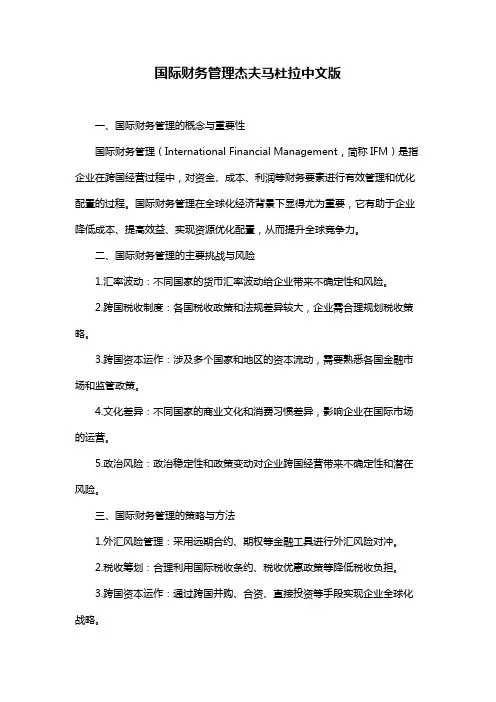
国际财务管理杰夫马杜拉中文版一、国际财务管理的概念与重要性国际财务管理(International Financial Management,简称IFM)是指企业在跨国经营过程中,对资金、成本、利润等财务要素进行有效管理和优化配置的过程。
国际财务管理在全球化经济背景下显得尤为重要,它有助于企业降低成本、提高效益、实现资源优化配置,从而提升全球竞争力。
二、国际财务管理的主要挑战与风险1.汇率波动:不同国家的货币汇率波动给企业带来不确定性和风险。
2.跨国税收制度:各国税收政策和法规差异较大,企业需合理规划税收策略。
3.跨国资本运作:涉及多个国家和地区的资本流动,需要熟悉各国金融市场和监管政策。
4.文化差异:不同国家的商业文化和消费习惯差异,影响企业在国际市场的运营。
5.政治风险:政治稳定性和政策变动对企业跨国经营带来不确定性和潜在风险。
三、国际财务管理的策略与方法1.外汇风险管理:采用远期合约、期权等金融工具进行外汇风险对冲。
2.税收筹划:合理利用国际税收条约、税收优惠政策等降低税收负担。
3.跨国资本运作:通过跨国并购、合资、直接投资等手段实现企业全球化战略。
4.财务报表整合:统一会计制度和报表格式,提高企业财务信息披露的透明度。
5.企业文化建设:加强跨文化沟通与培训,提升员工的国际化素质。
四、我国企业国际财务管理的现状与建议1.现状:我国企业国际化程度逐渐提高,但国际财务管理能力相对薄弱。
2.建议:加强国际财务管理培训,提高企业国际化经营水平;借助政策支持,拓展国际市场。
五、未来国际财务管理的发展趋势1.信息技术应用:大数据、云计算等新兴技术在国际财务管理领域的广泛应用。
2.环保与可持续发展:企业需关注环境保护和可持续发展,提高国际财务管理水平。
3.金融创新:金融衍生品、互联网金融等创新产品在国际财务管理中的作用日益凸显。
4.全球化治理:国际财务管理需适应全球化治理体系的变化,如国际财务报告准则的不断完善。

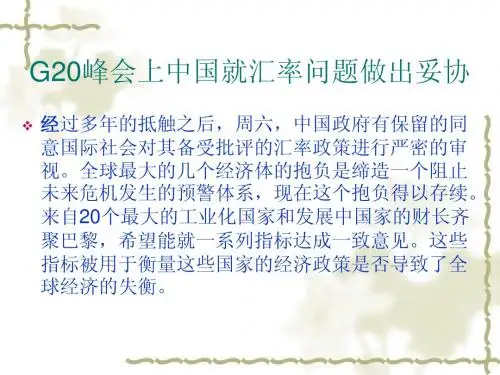

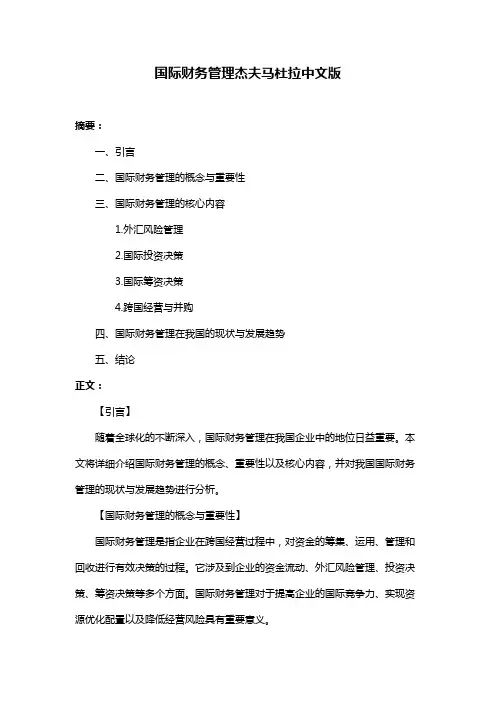
国际财务管理杰夫马杜拉中文版摘要:一、引言二、国际财务管理的概念与重要性三、国际财务管理的核心内容1.外汇风险管理2.国际投资决策3.国际筹资决策4.跨国经营与并购四、国际财务管理在我国的现状与发展趋势五、结论正文:【引言】随着全球化的不断深入,国际财务管理在我国企业中的地位日益重要。
本文将详细介绍国际财务管理的概念、重要性以及核心内容,并对我国国际财务管理的现状与发展趋势进行分析。
【国际财务管理的概念与重要性】国际财务管理是指企业在跨国经营过程中,对资金的筹集、运用、管理和回收进行有效决策的过程。
它涉及到企业的资金流动、外汇风险管理、投资决策、筹资决策等多个方面。
国际财务管理对于提高企业的国际竞争力、实现资源优化配置以及降低经营风险具有重要意义。
【国际财务管理的核心内容】1.外汇风险管理:外汇风险管理是国际财务管理的重要环节,主要包括对汇率风险、利率风险和通货膨胀风险的预测、评估和控制。
2.国际投资决策:企业在进行国际投资时,需要对投资项目进行充分的调查和分析,以实现投资回报的最大化。
3.国际筹资决策:企业在跨国经营过程中,需要根据自身的资金需求和风险承受能力,选择合适的筹资方式。
4.跨国经营与并购:跨国经营与并购是企业进行国际拓展的重要手段,企业需要对目标公司进行全面的评估,以确保并购的成功。
【国际财务管理在我国的现状与发展趋势】当前,我国企业在进行国际财务管理时,普遍面临着风险意识不足、管理手段落后、人才短缺等问题。
为应对这些问题,我国政府和企业需要加大对外汇风险管理、国际投资决策、国际筹资决策等方面的研究和实践力度,培养一批具有国际视野和专业素养的国际财务管理人才。
【结论】总之,国际财务管理在企业跨国经营过程中发挥着重要作用。
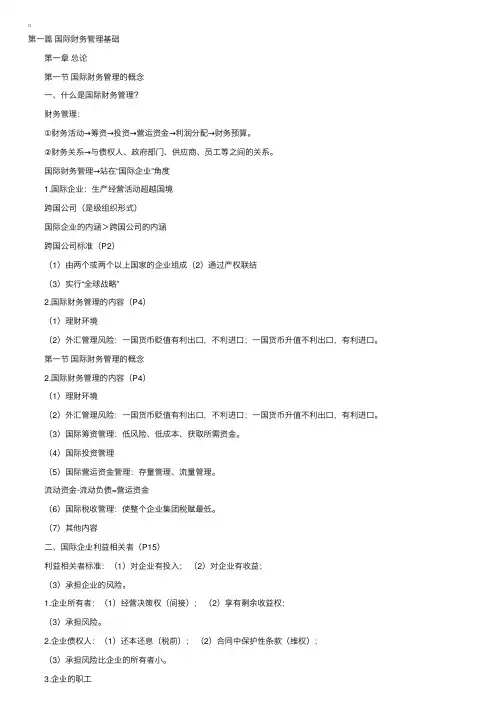
第⼀篇国际财务管理基础 第⼀章总论 第⼀节国际财务管理的概念 ⼀、什么是国际财务管理? 财务管理: ①财务活动→筹资→投资→营运资⾦→利润分配→财务预算。
②财务关系→与债权⼈、政府部门、供应商、员⼯等之间的关系。
国际财务管理→站在“国际企业”⾓度 1.国际企业:⽣产经营活动超越国境 跨国公司(是级组织形式) 国际企业的内涵>跨国公司的内涵 跨国公司标准(P2) (1)由两个或两个以上国家的企业组成(2)通过产权联结 (3)实⾏“全球战略” 2.国际财务管理的内容(P4) (1)理财环境 (2)外汇管理风险:⼀国货币贬值有利出⼝,不利进⼝;⼀国货币升值不利出⼝,有利进⼝。
第⼀节国际财务管理的概念 2.国际财务管理的内容(P4) (1)理财环境 (2)外汇管理风险:⼀国货币贬值有利出⼝,不利进⼝;⼀国货币升值不利出⼝,有利进⼝。
(3)国际筹资管理:低风险、低成本、获取所需资⾦。
(4)国际投资管理 (5)国际营运资⾦管理:存量管理、流量管理。
流动资⾦-流动负债=营运资⾦ (6)国际税收管理:使整个企业集团税赋最低。
(7)其他内容 ⼆、国际企业利益相关者(P15) 利益相关者标准:(1)对企业有投⼊;(2)对企业有收益; (3)承担企业的风险。
1.企业所有者:(1)经营决策权(间接);(2)享有剩余收益权; (3)承担风险。
2.企业债权⼈:(1)还本还息(税前);(2)合同中保护性条款(维权); (3)承担风险⽐企业的所有者⼩。
3.企业的职⼯ 4.政府:通过税收、⽆偿强制。
第⼆节国际财务管理的⽬标 三、国际财务管理的⽬标(P7) 两个⽬标: 1.股东财富化:股东利益、股票价格化。
2.企业价值化:在“全体利益相关者”的⾓度。
股东财富化: 股票价格化(P11) 优点:(1)考虑了时候价值;(2)考虑了风险价值; (3)克服了短期化;(4)直观。
缺点:(1)只适合于上市公司; (2)股市上影响股票价格的因素具有多样化;(3)只强调股东的利益。
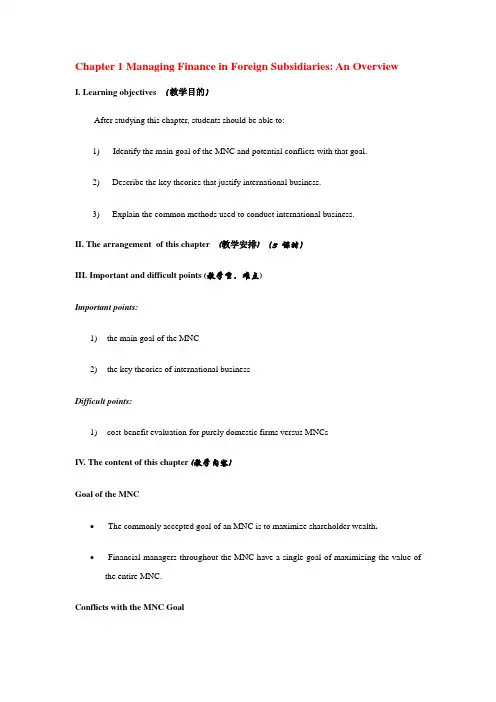
Chapter 1 Managing Finance in Foreign Subsidiaries: An OverviewI. Learning objectives (教学目的)After studying this chapter, students should be able to:1)Identify the main goal of the MNC and potential conflicts with that goal.2)Describe the key theories that justify international business.3)Explain the common methods used to conduct international business.II. The arrangement of this chapter (教学安排) (3 课时)III. Important and difficult points (教学重、难点)Important points:1)the main goal of the MNC2)the key theories of international businessDifficult points:1)cost-benefit evaluation for purely domestic firms versus MNCsIV. The content of this chapter (教学内容)Goal of the MNC•The commonly accepted goal of an MNC is to maximize shareholder wealth.•Financial managers throughout the MNC have a single goal of maximizing the value of the entire MNC.Conflicts with the MNC Goal•Subsidiary managers may be tempted to make decisions that maximize the values of their respective subsidiaries.Impact of Management Control•The magnitude of agency costs can vary with the management style of the MNC.• A centralized management style reduces agency costs.• A decentralized style gives more control to those managers who are closer to the subsidiary’s operations and environment.Theories of International Business❶Theory of Comparative AdvantageWhen a country specializes in some products, it may not produce other products, so trade between countries is essential. This is the argument made by the classical theory of comparative advantage. Specialization by countries can increase production efficiency.❷Imperfect Markets TheoryThe markets for the various resources used in production are “imperfect.”The real world suffers from imperfect market conditions where factors of production are somewhat immobile. There are costs and often restrictions related to the transfer of labor and other resources used for production. There may also be restrictions on transferring funds and other resources among countries.❸Product Cycle TheoryAccording to this theory, firms become established in the home market as a result of some perceived advantage over existing competitors. A firm is likely to establish itself first in its home country because information about markets and competition is more readily available at home. As a firm matures, it may recognize additional opportunities outside its home country.(The international product life cycle on transparency 10)International Business Methods❶International trade involves exporting and/or importing.❷Licensing allows a firm to provide its technology in exchange for fees or some other benefits.❸Franchising obligates a firm to provide a specialized sales or service strategy, support assistance, and possibly an initial investment, in exchange for periodic fees.❹Firms may also penetrate foreign markets by engaging in a joint venture (joint ownership and operation) with firms that reside in those markets.❺Acquisitions of existing operations in foreign countries allow firms to quickly gain control over foreign operations as well as a share of the foreign market.❻Firms can also penetrate foreign markets by establishing new foreign subsidiaries.International Opportunities•Investment opportunities¤The marginal returns on MNC projects are above those of purely domestic firms since MNCs have expanded opportunity sets of possible projects from which toselect.•Financing opportunities¤MNCs can obtain capital funding at a lower cost due to their larger opportunity set of funding sources around the world.•Opportunities in Europe¤the Single European Act of 1987¤the removal of the Berlin Wall in 1989¤the inception of the euro in 1999¤the expansion of the European Union•Opportunities in Latin America¤the North American Free Trade Agreement (NAFTA) of 1993¤the removal of investment restrictions•Opportunities in Asia¤the removal of investment restrictions¤the impact of the Asian crisis in 1997-1998Exposure to International RiskInternational business usually increases an MNC’s exposure to:exchange rate movements,foreign economies and political risk.。
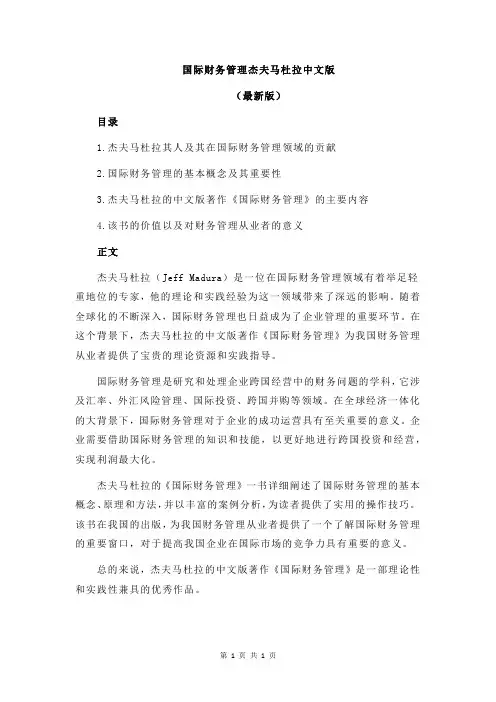
国际财务管理杰夫马杜拉中文版
(最新版)
目录
1.杰夫马杜拉其人及其在国际财务管理领域的贡献
2.国际财务管理的基本概念及其重要性
3.杰夫马杜拉的中文版著作《国际财务管理》的主要内容
4.该书的价值以及对财务管理从业者的意义
正文
杰夫马杜拉(Jeff Madura)是一位在国际财务管理领域有着举足轻重地位的专家,他的理论和实践经验为这一领域带来了深远的影响。
随着全球化的不断深入,国际财务管理也日益成为了企业管理的重要环节。
在这个背景下,杰夫马杜拉的中文版著作《国际财务管理》为我国财务管理从业者提供了宝贵的理论资源和实践指导。
国际财务管理是研究和处理企业跨国经营中的财务问题的学科,它涉及汇率、外汇风险管理、国际投资、跨国并购等领域。
在全球经济一体化的大背景下,国际财务管理对于企业的成功运营具有至关重要的意义。
企业需要借助国际财务管理的知识和技能,以更好地进行跨国投资和经营,实现利润最大化。
杰夫马杜拉的《国际财务管理》一书详细阐述了国际财务管理的基本概念、原理和方法,并以丰富的案例分析,为读者提供了实用的操作技巧。
该书在我国的出版,为我国财务管理从业者提供了一个了解国际财务管理的重要窗口,对于提高我国企业在国际市场的竞争力具有重要的意义。
总的来说,杰夫马杜拉的中文版著作《国际财务管理》是一部理论性和实践性兼具的优秀作品。
第1页共1页。
国际财务管理杰夫马杜拉中文版摘要::1.国际财务管理概述2.国际财务管理的核心概念3.国际财务管理的主要任务4.国际财务管理策略与方法5.我国在国际财务管理中的实践与挑战6.结论与展望接下来,我将根据为您详细撰写一篇文章:正文:国际财务管理(IFM)是一个涉及跨国企业在不同国家进行财务活动的领域。
IFM 的目标是确保企业在进行全球业务时能够有效地管理风险、优化资源配置并实现利润最大化。
1.国际财务管理概述IFM 涵盖了广泛的主题,包括外汇风险管理、国际投资决策、跨国公司财务结构、国际税收筹划以及国际贸易融资等。
IFM 不仅需要了解国内财务知识,还需要熟悉国际金融市场、国际金融法规以及国际商业环境。
2.国际财务管理的核心概念IFM 的核心概念包括汇率风险、利率风险、流动性风险和信用风险等。
了解这些风险对于制定有效的财务管理策略至关重要。
此外,还需要掌握国际财务市场的基本知识,例如外汇市场、国际债券市场和跨国公司股票市场等。
3.国际财务管理的主要任务IFM 的主要任务包括:制定全球财务策略、优化全球资本结构、进行全球投资决策、管理全球风险、制定全球财务报告以及遵守国际税收法规等。
这些任务有助于企业在全球范围内实现财务目标。
4.国际财务管理策略与方法IFM 策略和方法包括:风险管理、投资组合优化、财务预测和预算、财务分析和报告等。
企业可以根据自身需求选择合适的方法和策略来管理其国际财务活动。
5.我国在国际财务管理中的实践与挑战随着我国企业“走出去”的步伐加快,国际财务管理在我国的重要性日益凸显。
然而,我国企业在进行国际财务管理时面临着诸多挑战,如汇率波动、融资困难、税收筹划复杂以及合规风险等。
因此,我国企业需要不断提高其国际财务管理能力,以应对这些挑战。
6.结论与展望国际财务管理对企业的全球化战略至关重要。
企业应充分利用现有的IFM 策略和方法,以实现其全球财务目标。
《国际财务管理》教学大纲二、课程的对象和性质国际财务管理的教学对象是金融学专业的高年级本科生。
该课程是金融专业(国际金融方向)的专业选修课。
该课程理论与应用相结合,尤其注重培养学生对国际财务管理方法的应用能力。
三、课程的教学目的和要求教学目的:通过本课程的学习,学生应掌握跨国企业国际筹资管理、国际投资管理、外汇收支管理、外汇风险管理以及跨国企业内部资金管理等基本理论,初步掌握国际投融资的决策思路和分析方法,掌握汇率预测和外汇风险管理方法,为以后工作打下理论基础。
教学要求:本课程要求学生修完经济学、货币银行学、国际金融、证券投资学、财务管理学,财政学等金融专业基础课程。
四、授课方法在教学中,贯彻理论联系实际的教学原则,采用课堂讲授与课堂讨论、案例分析、课后练习等相结合的方式。
五、理论教学内容与基本要求(含学时分配)第一章国际财务管理概论课时安排:4课时教学要求:本章要求掌握国际财务管理的内涵。
理解国际财务管理的重要性。
了解国际经营的理论基础与基本方法。
教学重点和难点:本章的教学重点是国际财务管理的内涵。
难点是国际经营理论与方法。
教学内容:第一节:国际企业1.何为国际企业2.企业国际化进程3.经济全球化的动因第二节:国际财务管理1.国际财务管理概念2.国际财务管理内容3.影响跨国公司目标的利益集团第三节:国际经营理论与方法1.国际经营理论(比较优势理论、不完全竞争理论、国际产品生命周期理论)2.国际经营方法第四节:国际机遇与风险1.国际财务管理组织模式、集权模式特点、分权模式特点2.影响国际财务管理组织模式的因素第二章跨国公司与金融环境课时安排:2课时教学要求:本章要求掌握国际企业防范风险的主要工具。
理解国际企业发展的金融环境。
了解国际金融市场和国际资本流动的特征。
教学重点和难点:本章的教学重点和难点均是国际企业防范风险的主要工具。
教学内容:第一节:国际金融市场1.何为国际金融市场2.国际金融市场类型及作用3.国际企业利用国际金融市场的动机4.国际企业利用外资流程第二节:国际资本流动1.国际资本流动的内涵2.国际收支平衡表3.影响经常项目的主要因素4.影响资本项目的主要因素5.自由贸易区发展6.国际资本流动新趋势第三节:货币期货与期权1.货币期货市场(货币期货合约基本特征、利用货币期货合约)2.货币期权市场(利用看涨期权、利用看跌期权)第三章汇率预测课时安排:2课时教学要求:本章要求掌握汇率预测的基本方法。